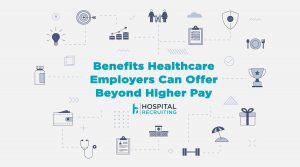
In an era where healthcare faces unprecedented challenges and rapid advancements, creating an attractive benefits package for healthcare professionals extends far beyond competitive salaries. It’s about recognizing and responding to the diverse, evolving needs of those in high-demand roles, such as physicians, physician assistants (PAs), and nurse practitioners (NPs).
This task requires a holistic approach, intertwining financial, personal, and professional aspects to construct a comprehensive package that resonates with the multifaceted lives of healthcare workers. It’s not just about what we give them in monetary terms, but how we support their career growth, personal well-being, and work-life balance.
As healthcare employers, we are tasked with understanding our employees’ intrinsic motivations and the external factors affecting their profession. The benefits must address these unique dynamics, from the high-stress environments that come with life-saving responsibilities to the continuous need for professional development in an ever-evolving field.
Moreover, crafting these benefits packages must be adaptive and innovative, aligning with the changing landscape of healthcare employment. The goal is to create an environment where healthcare professionals feel valued, supported, and equipped to handle the challenges of their roles, which in turn enhances recruitment and retention efforts.
In the following sections, we will explore various dimensions of such benefits packages, specifically tailored to meet the needs and expectations of healthcare professionals today.
Comprehensive Health and Wellness Benefits

Healthcare professionals face unique challenges; a well-rounded benefits package must reflect this. The key elements include:
- Robust Health Insurance: This is a cornerstone of your offering. Go beyond basic coverage to offer comprehensive medical, dental, and vision plans. These should be adaptable to cater to a wide range of needs, from single individuals to those with families.
- Mental Health Support: The high-pressure environment in healthcare necessitates strong mental health support. This can include accessible counseling services, provision for mental health days, and wellness programs focusing on cognitive and emotional well-being. Such initiatives demonstrate your commitment to the holistic health of your employees, contributing to a healthier, more positive workplace.
By investing in these areas, you not only enhance the appeal of your benefits package but also foster an environment where employees feel genuinely cared for and supported.
Work-Life Balance and Flexibility

Maintaining a healthy work-life balance is crucial in the high-stress field of healthcare. Here’s how employers can support this:
- Flexible Scheduling: Introduce options like flexible work hours or compressed work weeks. This flexibility allows healthcare professionals to better balance their commitments with professional responsibilities, leading to increased job satisfaction and reduced burnout.
- Remote Work Opportunities: Wherever possible, offer remote work options. This is especially appealing for administrative roles and can be a significant factor in attracting and retaining talent. It demonstrates a trust in employees’ ability to manage their workload effectively, regardless of location.
These strategies show a commitment to adapting to the changing needs of healthcare professionals, which is crucial for creating a supportive and sustainable work environment.
Career Development and Educational Opportunities

In the dynamic world of healthcare, continuous learning and leadership development are vital. Here’s how employers can facilitate this growth:
- Continuing Education: Emphasize support for ongoing education. This can include funding for attending conferences, participating in workshops, or obtaining additional certifications. Such support is valued and crucial in a field that constantly evolves with new medical advancements and practices.
- Leadership Training: Offer structured leadership and management training programs. This particularly benefits employees aspiring to take on more significant organizational roles. Providing these opportunities not only aids in their professional growth but also helps in building a solid leadership pipeline within your organization.
These initiatives show a commitment to employees’ professional growth, enhancing their engagement and loyalty to the organization.
Unique Perks for High-End Employees

To cater to the specific needs of high-end healthcare professionals like physicians, PAs, and NPs, consider these tailored benefits:
- Specialized Insurance Options: Offer insurance plans that address these roles’ unique risks and demands, such as higher coverage limits or specific health services.
- Enhanced Continuing Education Allowances: Recognize their ongoing need for advanced education by offering higher allowances or dedicated funds for specialized training and certifications.
- Exclusive Wellness Programs: Develop wellness programs specifically designed for these high-end professionals, acknowledging their intense pressures and providing targeted support for their mental and physical well-being.
These tailored benefits show a deep understanding and appreciation of the unique challenges faced by these professionals, enhancing your organization’s attractiveness as an employer.
Retirement and Financial Planning

Addressing the long-term financial well-being of employees is crucial. Here’s how this can be done:
- Retirement Plans: Implement competitive retirement plans like 401(k) or 403(b) with employer matching. This not only aids in securing your employees’ financial future but also acts as an incentive for long-term tenure.
- Financial Planning Services: Offering financial planning and advisory services as a benefit caters to employees at different stages of their careers. This service can help them make informed decisions about investments, savings, and retirement planning, providing a sense of security and financial literacy.
These elements of financial planning demonstrate a commitment to the overall well-being of your employees, extending beyond their immediate professional life into their future.
Family and Community Support

Supporting the family and community involvement of employees is essential. Here’s how it can be integrated:
- Childcare Support: Providing childcare assistance is crucial for employees with families. This can be through onsite childcare facilities, partnerships with local providers, or financial subsidies for childcare. Such support helps employees balance their professional and personal responsibilities more effectively.
- Community Involvement Opportunities: Encourage and facilitate volunteer work or community engagement opportunities. This strengthens community ties and enhances employees’ sense of purpose and job satisfaction.
By incorporating these aspects, employers can create a more supportive and inclusive workplace, acknowledging and addressing the diverse needs of their employees’ lives outside of work.
Conclusion
To excel in the dynamic healthcare industry, employers must go beyond salary considerations to attract and retain top talent. A comprehensive benefits package tailored to the multifaceted needs of healthcare professionals is crucial. Such a package should meet basic requirements and offer support in areas like work-life balance, career development, and family needs. This approach fosters a more satisfied, engaged, and dedicated workforce.
For roles such as physicians, PAs, and NPs, customizing benefits to address their specific challenges further enhances an organization’s attractiveness. However, this article is merely a starting point. A deeper understanding of each aspect, continuous dialogue with healthcare staff, and reference to the provided resources are essential in crafting a compelling, appealing benefits strategy that resonates with the unique needs of healthcare professionals.
